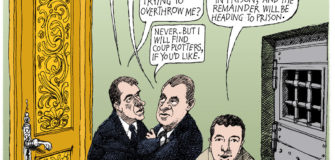Western Help for Ukraine
Ukraine is teetering on the edge of civil war. Courageous public demonstrations in Kiev and sympathetic parliamentary actions have caused the pro-Russian president of Ukraine, Viktor Yanukovych, to flee the capital. He has found sympathetic citizens, many of them armed, in the Eastern half of Ukraine and the Crimea. Russian influence is greatest in these regions. The Western half of Ukraine historically looks to Europe, and the present European Union in particular.
As the violence and political uncertainty in this strategically important country rise, the likelihood of warfare between East and West increases. Local leaders are already showing signs that they will exploit resentment of the people on the “other side” of the country’s divide to inspire more extreme and violent behavior. Ukraine echoes some of the dangerous dynamics seen in Yugoslavia at the end of the Cold War. There are no simple saviors or clear solutions for a country pulling itself apart.
One historical lesson from Yugoslavia and other civil wars is that time is not on the side of peace. Conflict will escalate and spread if strong actions are not taken to stop the descent to civil war. In addition, the most extreme voices on both sides will gain influence if no one else fills the leadership vacuum created in Kiev after the president’s departure.
In Yugoslovia the United States deferred to its European partners when the civil war began. They proved incapable of taking effective action to stop what became a genocidal conflict. The same is true for the United Nations which often provided aid and cover to the most violent forces. Russia alternated between aiding its allies in the Yugoslav conflict, and pushing for international agreements that legitimized the most violent forms of ethnic cleansing.
The civil war in Yugoslavia only began to diminish after the United States became deeply involved, more than three years after the conflict began. Even then, American intervention had mixed results before the ultimate division of the country into separate ethnic states, and the arrest of numerous war criminals, especially Serbian leader Slobodan Milosevic. The United States was a late-comer to the conflict, and its influence was episodic and inconsistent.
In Ukraine we should expect similar difficulties, but the options for effective American and European influence will only decrease with time. The United States and the European Union need to formulate a joint strategy for early and decisive diplomatic actions to help bring stability, democracy, and firmer Western-orientation to Ukrainian politics. They need to work with their Russian counterparts, where possible, but also show a clear determination to contain Russian efforts at pulling Ukraine fully under Moscow’s control. Russian President Vladimir Putin’s heavy-handed efforts to exclude the European Union initiated the present crisis. We should not expect Putin to backdown anytime soon.
What actions should the United States and the European Union undertake? Leaders in Washington, Brussels, Berlin, London, and Paris should step forward with strong statements of support for a democratic political process that includes fair elections, a coalition government, and continued freedom for public demonstrations. They should formulate a package of economic aid and other forms of support that they will release to Ukraine when the political process produces a coalition government, following the now-scheduled May elections. The International Monetary Fund can help with promised loans as well. Most of all, the Western leaders should emphasize that they will focus attention on events in Ukraine, supporting freedom and stability, and condemning acts of repression and coercion, if they occur. Putin and other advocates of undemocratic politics should pay a public price for their actions.
These proposed solutions will not determine the outcome in Ukraine. That is up to the citizens on the ground, many of whom want to live a stable and democratic life as a part of Europe. What these actions can insure, however, is that American and European preferences are clear and unequivocal for everyone in the region. What these actions will also insure, is that powerful external actors are incentivizing democratic and cooperative behavior, rather than civil war.
American and European options are limited, but opportunities to support positive developments still exist. The experience in Yugoslavia at the end of the twentieth century should remind us that apathy and indecisiveness are dangerous. Targeted acts of support for democracy are crucial to curtail a rapid slide to civil war in Europe’s backyard.
The opinions expressed in this blog are personal and do not necessarily reflect the views of either Global Brief or the Glendon School of Public and International Affairs.





